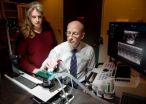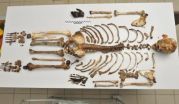(Press-News.org) ST. LOUIS – In a research review article published in the American Journal of Nephrology, Saint Louis University investigators examined data from multiple studies to better understand how obesity, an epidemic in the U.S., impacts kidney transplant patients. The authors report that, even as some connections between weight and health outcomes are unknown or contradictory, there is evidence that obese kidney transplant patients don't do as well after surgery, experiencing more adverse outcomes, including wound infections, delayed graft function, graft failure, cardiac disease and increased costs.
Led by Krista Lentine, M.D., associate professor of internal medicine in nephrology and Betsy Tuttle-Newhall, M.D., director of abdominal transplant at SLU, the authors examined multiple studies and concluded that the health outcomes of patients with higher body mass indices (BMI) are not as good. In addition, they found several areas where more study is needed in order to make clear and consistent recommendations about kidney transplants for heavier patients.
"Lifestyle alterations that seem reasonable to improve health outcomes should be encouraged," Tuttle Newhall said. "Just as we require patients with alcoholic liver disease to stop drinking prior to transplant, it is reasonable to ask kidney transplant candidates to lose excess body fat and attempt to increase lean muscle mass by becoming more physically active and modifying their diet."
Lentine, who also holds an appointment in the Saint Louis University Center for Outcomes Research (SLUCOR), says the study points the way for future research to fill in gaps in our knowledge about how weight affects kidney transplant patients.
"Current guidelines from the American Society of Transplantation recommend a supervised weight loss regimen including a low-calorie diet, behavioral therapy, and a physical activity plan to achieve a body mass index (BMI) of less than 30 prior to kidney transplantation," Lentine said. "But, these guidelines also note that we don't have enough data to determine if some obese patients aren't appropriate candidates to receive kidney transplants at all.
"For this reason, current acceptable BMI limits for kidney transplant candidates vary across transplant centers."
The authors say future investigations should seek to determine the upper BMI limit at which point kidney transplantation should not be recommended for obese patients. In addition researchers note the limitations of BMI alone as a measure of body fat, and suggest further research using more refined measures.
While obese transplant recipients appear to have worse outcomes compared to normal weight recipients, the authors also note that many obese dialysis patients have better long-term survival after a transplant compared with remaining on dialysis.
In addition, doctors are aware of an "obesity paradox" when it comes to dialysis patients. Kidney patients on dialysis appear to benefit from extra fat, living longer than normal weight patients. Researchers do not know how extra weight provides a protective benefit, but believe that this relative benefit does not occur in transplant scenarios.
The benefit of losing weight prior to a kidney transplant also is unproven. More study is needed to determine whether intentional weight loss before surgery, including diet, exercise and bariatric surgery, does, in fact, improve outcomes. The current understanding is murky because the available data does not distinguish between weight lost deliberately, through healthy diet, exercise or bariatric surgery, and spontaneous weight loss due to illness.
Bariatric surgery, in particular, needs to be studied further. Dialysis patients face bigger risks from surgery and it is unknown if it serves to offset the apparent risks of obesity when performed prior to a kidney transplant.
"This review showed us where there are gaps in the existing research and where current data is too light to be able to draw solid conclusions," said Lentine. "These gaps are what 'outcomes research' is designed to remedy.
"We've figured out some key questions to ask so that we can help our patients have successful transplants and healthy lives."
BOTTOM LINE
Obesity appears to affect kidney transplant patients in a negative way, leading to complications during their recovery.
Kidney patients should know that their weight may affect the success of a transplant and should work with their doctor to manage it in a healthy way.
Doctors need future studies to examine the upper BMI limit at which kidney transplantation should not be recommended for obese patients, to refine ways of measuring obesity, and to define the benefits of losing weight prior to a kidney transplant.
### The Saint Louis University Center for Outcomes Research (SLUCOR) leads projects in a broad range of clinical areas, including organ transplantation, diabetes, cardiovascular disease, health care quality and pharmacoepidemiology (the study of the use and effect of prescription drugs). SLUCOR's research is funded through the National Institutes of Health, Centers for Disease Control and Prevention, nonprofit agencies and corporate sponsors. As a degree-granting center, SLUCOR works closely with Saint Louis University's schools of medicine and public health. Together, they've formed a vibrant community of faculty, staff and students committed to strengthening the delivery and outcomes of medical care through innovative research and education.
Are some patients too heavy for a new kidney?
SLU researchers examine outcomes for obese transplant recipients
2013-01-14
ELSE PRESS RELEASES FROM THIS DATE:
Noise protection – multifunctional and aesthetical
2013-01-14
Too much noise causes illness. This is as an undisputed fact nowadays, and yet we're still constantly assailed by noise as we go about our daily lives, be it from traffic or voices in large open-plan offices. Noise pollution can be reduced with the help of structural solutions; we've all seen noise barriers along busy roads and train lines, and there are special acoustic structural components, so-called sound absorbers, which are used inside buildings to keep noise levels down. But there's a problem. The construction components used up until now may well be effective at ...
Can acupuncture improve exercise performance and post-exercise recovery?
2013-01-14
New Rochelle, NY, January 14, 2013—The effects of acute acupuncture applied during exercise on performance factors such as power and blood pressure and on the body's ability to recover post-exercise were evaluated in a review article published in The Journal of Alternative and Complementary Medicine, a peer-reviewed journal from Mary Ann Liebert, Inc., publishers. The article is available free on the Journal website at http://www.liebertpub.com/acm.
A review of the literature uncovered four studies designed to test whether a person receiving acupuncture while exercising ...
Stem-cell approach shows promise for Duchenne muscular dystrophy
2013-01-14
CHAMPAIGN, Ill. — Researchers have shown that transplanting stem cells derived from normal mouse blood vessels into the hearts of mice that model the pathology associated with Duchenne muscular dystrophy (DMD) prevents the decrease in heart function associated with DMD.
Their findings appear in the journal Stem Cells Translational Medicine.
Duchenne muscular dystrophy is a genetic disorder caused by a mutation in the gene for dystrophin, a protein that anchors muscle cells in place when they contract. Without dystrophin, muscle contractions tear cell membranes, leading ...
Social networks may inflate self-esteem, reduce self-control
2013-01-14
PITTSBURGH/NEW YORK—January 14, 2013— Users of Facebook and other social networks should beware of allowing their self-esteem—boosted by "likes" or positive comments from close friends—to influence their behavior: It could reduce their self-control both on and offline, according to an academic paper by researchers at the University of Pittsburgh and Columbia Business School that has recently been published online in the Journal of Consumer Research.
Titled "Are Close Friends the Enemy? Online Social Networks, Self-Esteem, and Self-Control," the research paper demonstrates ...
Fox Chase researchers discover novel role of the NEDD9 gene in early stages of breast cancer
2013-01-14
PHILADELPHIA, PA (January 14, 2013)—Breast cancer is the second leading cause of cancer deaths among women in the United States. Many of these deaths occur when there is an initial diagnosis of invasive or metastatic disease. A protein called NEDD9—which regulates cell migration, division and survival—has been linked to tumor invasion and metastasis in a variety of cancers. Researchers at Fox Chase Cancer Center have now shown that NEDD9 plays a surprising role in the early stages of breast tumor development by controlling the growth of progenitor cells that give rise to ...
Pill-sized device provides rapid, detailed imaging of esophageal lining
2013-01-14
Physicians may soon have a new way to screen patients for Barrett's esophagus, a precancerous condition usually caused by chronic exposure to stomach acid. Researchers at the Wellman Center for Photomedicine at Massachusetts General Hospital (MGH) have developed an imaging system enclosed in a capsule about the size of a multivitamin pill that creates detailed, microscopic images of the esophageal wall. The system has several advantages over traditional endoscopy.
"This system gives us a convenient way to screen for Barrett's that doesn't require patient sedation, a ...
The secrets of a tadpole's tail and the implications for human healing
2013-01-14
Scientists at The University of Manchester have made a surprising finding after studying how tadpoles re-grow their tails which could have big implications for research into human healing and regeneration.
It is generally appreciated that frogs and salamanders have remarkable regenerative capacities, in contrast to mammals, including humans. For example, if a tadpole loses its tail a new one will regenerate within a week. For several years Professor Enrique Amaya and his team at The Healing Foundation Centre in the Faculty of Life Sciences have been trying to better understand ...
Cancer suppressor gene links metabolism with cellular aging
2013-01-14
PHILADELPHIA - It is perhaps impossible to overstate the importance of the tumor suppressor gene p53. It is the single most frequently mutated gene in human tumors. p53 keeps pre-cancerous cells in check by causing cells, among other things, to become senescent – aging at the cellular level. Loss of p53 causes cells to ignore the cellular signals that would normally make mutant or damaged cells die or stop growing.
In short, the p53 pathway is an obvious and attractive target for drug developers. But that strategy has so far proven difficult, as most p53 regulatory proteins ...
The genome of diamondback moth provides new clues for sustainable pest management
2013-01-14
January 13, 2013, Fujian and Shenzhen, China- An international research consortium, led by Fujian Agriculture, Forestry University (FAFU) and BGI, has completed the first genome sequence of the diamondback moth (DBM), the most destructive pest of brassica crops. This work provides wider insights into insect adaptation to host plant and opens new ways for more sustainable pest management. The latest study was published online today in Nature Genetics.
The diamondback moth (Plutella xylostella) preferentially feeds on economically important food crops such as rapeseed, cauliflower ...
What did our ancestors look like?
2013-01-14
A new method of establishing hair and eye colour from modern forensic samples can also be used to identify details from ancient human remains, finds a new study published in BioMed Central's open access journal Investigative Genetics. The HIrisPlex DNA analysis system was able to reconstruct hair and eye colour from teeth up to 800 years old, including the Polish General Wladyslaw Sikorski (1881 to 1943) confirming his blue eyes and blond hair.
A team of researchers from Poland and the Netherlands, who recently developed the HIrisPlex system for forensic analysis, have ...
LAST 30 PRESS RELEASES:
Striking genomic architecture discovered in embryonic reproductive cells before they start developing into sperm and eggs
Screening improves early detection of colorectal cancer
New data on spontaneous coronary artery dissection (SCAD) – a common cause of heart attacks in younger women
How root growth is stimulated by nitrate: Researchers decipher signalling chain
Scientists reveal our best- and worst-case scenarios for a warming Antarctica
Cleaner fish show intelligence typical of mammals
AABNet and partners launch landmark guide on the conservation of African livestock genetic resources and sustainable breeding strategies
Produce hydrogen and oxygen simultaneously from a single atom! Achieve carbon neutrality with an 'All-in-one' single-atom water electrolysis catalyst
Sleep loss linked to higher atrial fibrillation risk in working-age adults
Visible light-driven deracemization of α-aryl ketones synergistically catalyzed by thiophenols and chiral phosphoric acid
Most AI bots lack basic safety disclosures, study finds
How competitive gaming on discord fosters social connections
CU Anschutz School of Medicine receives best ranking in NIH funding in 20 years
Mayo Clinic opens patient information office in Cayman Islands
Phonon lasers unlock ultrabroadband acoustic frequency combs
Babies with an increased likelihood of autism may struggle to settle into deep, restorative sleep, according to a new study from the University of East Anglia.
National Reactor Innovation Center opens Molten Salt Thermophysical Examination Capability at INL
International Progressive MS Alliance awards €6.9 million to three studies researching therapies to address common symptoms of progressive MS
Can your soil’s color predict its health?
Biochar nanomaterials could transform medicine, energy, and climate solutions
Turning waste into power: scientists convert discarded phone batteries and industrial lignin into high-performance sodium battery materials
PhD student maps mysterious upper atmosphere of Uranus for the first time
Idaho National Laboratory to accelerate nuclear energy deployment with NVIDIA AI through the Genesis Mission
Blood test could help guide treatment decisions in germ cell tumors
New ‘scimitar-crested’ Spinosaurus species discovered in the central Sahara
“Cyborg” pancreatic organoids can monitor the maturation of islet cells
Technique to extract concepts from AI models can help steer and monitor model outputs
Study clarifies the cancer genome in domestic cats
Crested Spinosaurus fossil was aquatic, but lived 1,000 kilometers from the Tethys Sea
MULTI-evolve: Rapid evolution of complex multi-mutant proteins
[Press-News.org] Are some patients too heavy for a new kidney?SLU researchers examine outcomes for obese transplant recipients




